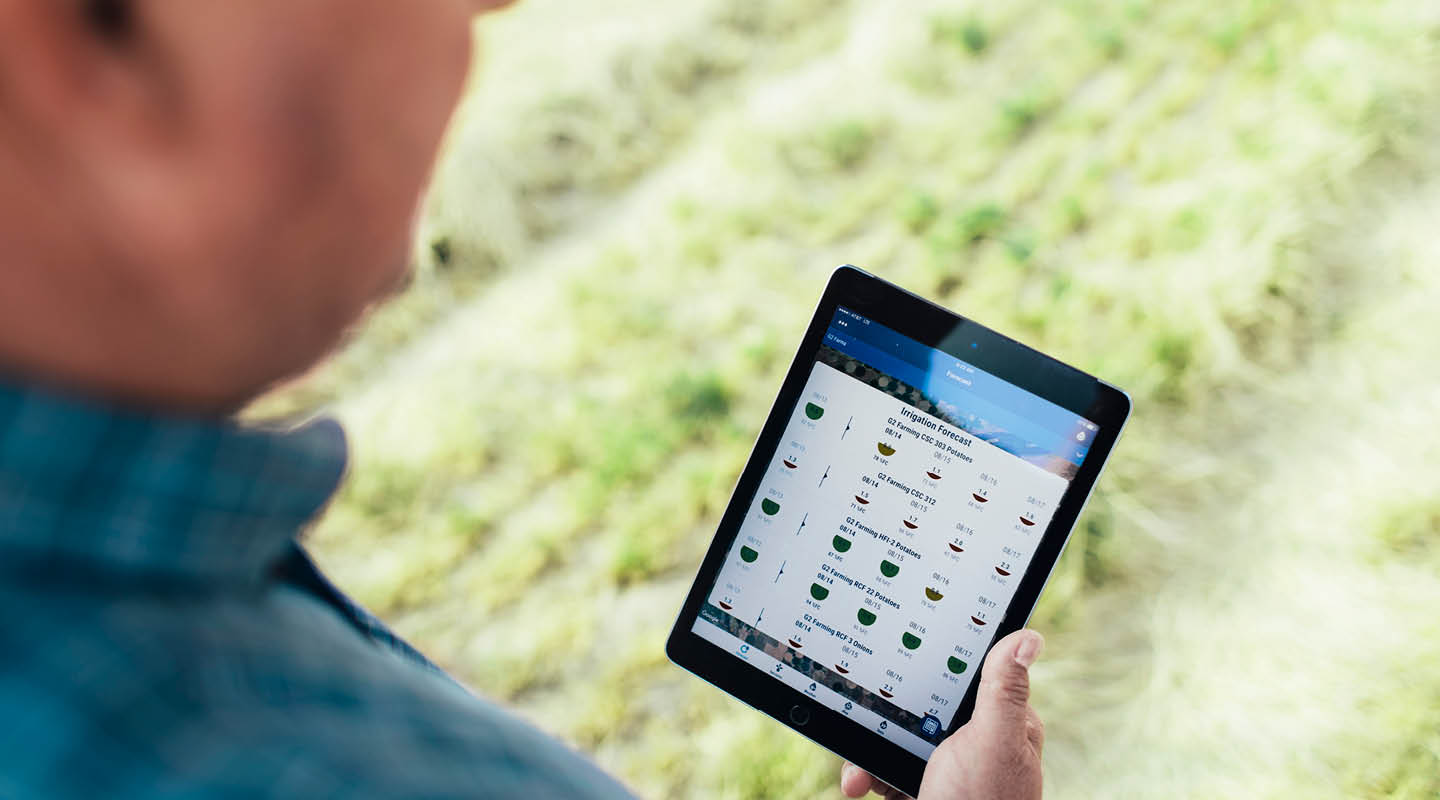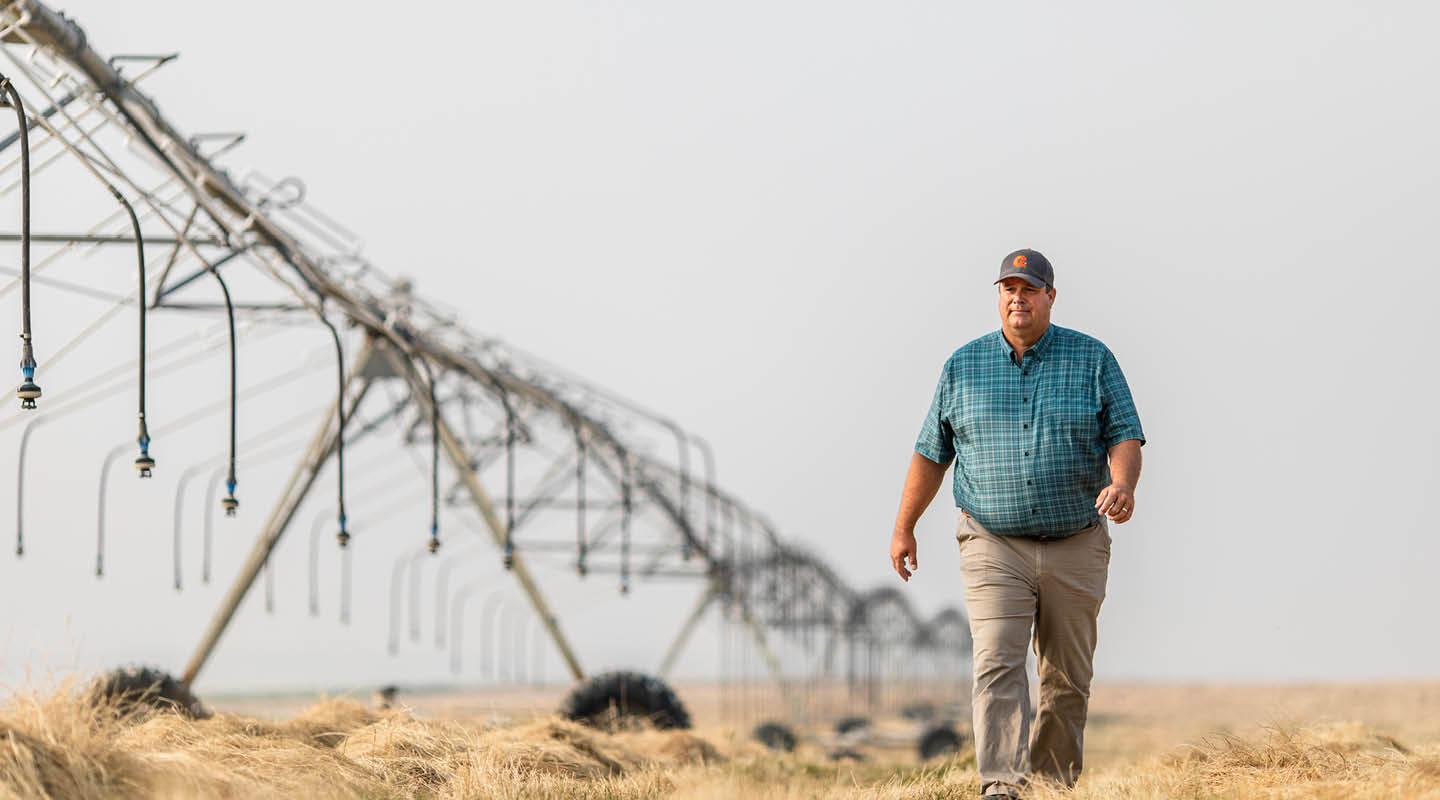Greg Juul and his partner, Troy Betz, own and operate G2 Farming near Hermiston, Oregon. He says technology has given them a competitive advantage. “We’ve definitely adopted a lot of tech that’s come into farming,” he said. “Valley technology has improved our operation right from the very beginning. When Troy and I took over the farm, we switched from a competitor’s brand to Valley, and quickly went to remote management of those systems.”
They began remotely managing their pivots and pumps in 2002, and now use them to irrigate up to 6,000 acres a year, depending on rotation. Their core business is irrigated potatoes, cultivating them on around half of their acres each year. “We rotate with fresh onions, alfalfa and grass seed as our primary crops,” Juul said, “and then we do some minor crops, such as seed corn and small vegetable crops like green peas and sweet corn.”
Those are sensitive crops, and their farm is located in an arid area of the state. “It’s high desert,” Juul explains. “Typically, the weather is dry and hot. It’s cold in the winter, and mild in the spring, but windy. Annual rainfall is 4-6 inches, so irrigation is a must in northeast Oregon.”
All of these factors made G2 Farming a natural to implement Valley Scheduling.
 Greg Juul uses Valley Scheduling to more accurately irrigate his high-value crops.
Greg Juul uses Valley Scheduling to more accurately irrigate his high-value crops.
Better Irrigation Decisions Based on Better Data
Valley Scheduling is an advanced management tool that helps growers make informed irrigation decisions based on data about soil, crop type, the crop’s stage of development and weather conditions. These inputs are entered, and Valley Scheduling delivers precise yet easy to understand recommendations to the grower’s mobile device or computer.
“We are currently utilizing Valley Scheduling on our high-value crops – potatoes and onions,” Juul said. “Those are the most sensitive to irrigation and the most critical in terms of irrigation timing.”
Juul describes Valley Scheduling this way: “It’s an automated version of what we’ve been doing for years: we’ve been going out field to field, digging with a shovel, squeezing the dirt, seeing how much moisture is in there, knowing whether it’s trending to dry or trending to wet. What Valley Scheduling does is give you an electronic version through the probes in the fields, and translates that data into what we’ve been doing for a long time.”
 Valley Scheduling analyzes a variety of data, including crop type, soil, weather information and the crop's stage of development, to recommend the most effective irrigation schedule.
Valley Scheduling analyzes a variety of data, including crop type, soil, weather information and the crop's stage of development, to recommend the most effective irrigation schedule.
Valley Scheduling gives growers all of this information at the touch of a finger to help make good irrigation decisions each 24-hour period. “Valley Scheduling is another tool – almost another set of eyes in the field – as to where your soil moisture is at, especially with critical crops,” Juul said. “It even helps us forecast fertilizer and chemical applications, where we may speed up or slow down the pivots, so it gives you that tool, knowing what the trend is in real time, and it’s been extremely good for us.”
Point and Click Precision
Like most people, Juul says time is probably the most valuable resource he has, and certainly one of the most limited, but technology like Valley Scheduling has allowed him to do more with the amount of time available.
“From our earliest discussions of implementing Scheduling, I’ve always said it’s got to save us time. Definitely, Valley Scheduling has done that for us,” Juul said. “Whether we switch water on the computer or whether we do it on our phones, Valley Scheduling is incredibly easy to use.”
Before Valley Scheduling and other smart irrigation solutions from Valley, Juul says it would take two or three people to make irrigation changes. “We’d probably spend 3-4 hours a day just changing water. Valley Scheduling has allowed us to make those decisions in minutes, where in years past we had to go to each field. Today I can change it at the pivot point, I can change it remotely at my home, or I can change it with my phone anywhere in the world,” he said.
“It’s all at your fingertips, really. You can’t ask for much more than that.”
Overcoming Challenges with Water
Juul’s uncle and Betz’s father and grandfather also farmed, starting their operation in 1973.
Juul himself returned to the farm four years after college and has been farming at G2 since 1995. In that time, he has realized the hefty challenge that irrigating in Oregon can be.
“Even though we’re fortunate to irrigate out of the Columbia River, water rights are not being given out of the Columbia due to environmental concerns and the endangered species act with salmon,” he explained. “So we’re operating under water right permits that were given to us in the early 1970s when the farm was developed.”
Also, he notes, one can only pump water to a certain elevation economically. Even with the presence of nearby dams, he says “the power cost to pump water to the farm is our fourth-largest cost to the operation … So being able to do a better job of irrigating with less water, just placing it better, getting it into the ground with less ET (evapotranspiration) is important.”
The increased precision that Valley Scheduling and other Valley solutions enable helps G2 in other ways. Oregon’s law allows a water user who conserves water to use a portion of that water on additional lands. “We operate with some conserved water right permits, as well, which the technology has brought to us,” Juul said.
 With precision irrigation technology from Valley, G2 Farming can save valuable resources.
With precision irrigation technology from Valley, G2 Farming can save valuable resources.
Trending in the Right Direction
Efficiency is the goal for G2 Farming. “When I came to the farm, we were farming about 2,000 to 2,500 acres and irrigating with three or four people. We’re now irrigating 5,000 to 6,000 acres a year and irrigating with one person,” Juul said. “Technology has made us very time efficient, and has made us very competitive in the management of irrigation costs.”
Valley Scheduling is the latest technological innovation that Juul has embraced to make their operation more productive. “It’s a time savings tool that allows me to see the entire farm at any given time. You can see all of your history at a click. It’s information that you can use to make good irrigation management decisions on a daily basis.”
His advice for other growers is simple. “Don’t be afraid to embrace technology like Valley Scheduling. There are a lot of proven products out there. They make you more efficient. They work right to your bottom line, and that’s what keeps us competitive in the industries that we’re in.”